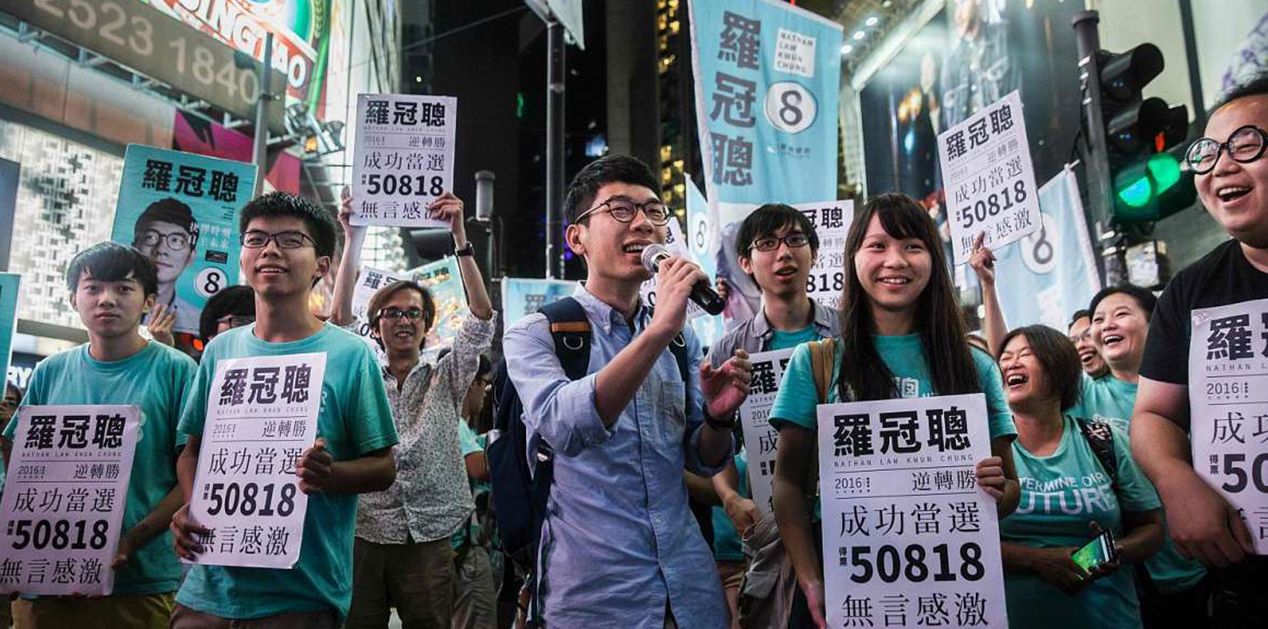Elections, 2016
On 4 September 2016, in a landmark development in the history of Hong Kong, the pro- democratic parties that stands for ‘self-determination’ in Hong Kong, won by sweeping majority in the legislative council (LegCo) elections. Since 1991, for the first time, there was a huge polling; around 2.2 million (58 per cent) people casted their votes. Last time, when the elections were held in 2012, at that time ‘independence’ was not on the agenda of the political parties. But the situations started changing after the “Umbrella Revolution” of 2014. Perhaps, the genesis of the current election results can be traced back to 2014 when Joshua Wang started the 79 day Umbrella Revolution and citizens of Hong Kong took to the streets in a rebellious challenge to China, demanding full democracy, universal suffrage and an end to the practice of pre-screening of the candidates before they are presented to the electorate of Hong Kong.
Brief History
Hong Kong became part of China after 156 years of British occupation on 1 July 1997. It then became part of ‘One Country, Two Systems’ and now forms one of the two Special Administrative Regions (SAR) of China. Hong Kong enjoys autonomy in all spheres except foreign and defence affairs for 50 year (till 2047). Article 31 of the Constitution of China provides for such an arrangement: “The state may establish special administrative region when necessary.” Today, Hong Kong is economically prosperous, with limited universal suffrage only in district council elections and parts of the legislative council.
Hong Kong has had five Chief Executives, three elected and two acting. The next elections for the Chief Executive are due in 2017. There have been widespread protests demanding the people’s right to freely choose their representative as outlined in the “mini constitution” of Hong Kong, the system that was implemented through the ‘Basic Law’ of Hong Kong. At present, China shortlists and screens the candidates for the position of the Chief Executive through a committee that is mostly comprised of pro-China elites who are appointed by the Central Government. Obviously, this defeats the real idea of One Country, Two Systems. Earlier, China had promised free elections in 2017 but is now resisting the open nomination of the candidates. Unhappy with these arrangements, the citizens have resorted to various means of protesting; two students groups, the ‘Hong Kong Federation’ and the ‘Scholarism’, have been prominent in asking for universal adult franchise. These tried to stage their demand through the said Umbrella Revolution and the protest was successful to the extent that it overshadowed the 65th anniversary of the Chinese Communist Party in Hong Kong.
After the 2014 revolution, the activists started launching several new political parties. The core principle of these parties was to distance themselves from China. Amongst them, the two most prominent one’s are the ‘Localist Party’ and the ‘Demosisto Party’. The Localist Party has many wings like the ‘Youngspiration’ political party, ‘Civic Passion’ party and many more. The Youngspiration political party was founded in 2015. It has an agenda of holding ‘self-determination’ referendum in 2020. The Civic Passion party was founded in 2016 and holds strong parochial views with militant approach of protests. As for the Demosisto political party, it was founded by Joshua Wong (of the Umbrella Revolution fame) and Nathan Law (the former head of Hong Kong Federation of Students) and fellow activists, Oscar Lai and Agnes Chow. The party advocates self-determination and self-governance.
Result of the Legislative Council Election 2016
Unpredictably, during the 2016 LegCo elections, six candidates who were involved with the Umbrella Revolution in one form or the other have won from their respective constituencies. One victorious leader is Nathan Law (23 years), belonging to the Demosisto party. He was one of the leaders of the Umbrella Revolution. Both Lau Siu-Lai and Eddie Chu (investigative journalist) also contested from the Demosisto party and won, and so did Sixtus “Baggio” Leung (30 years) and Yau Wai-ching, (25 years) who contested from Youngspiration party. Leung is nicknamed after his favourite Italian football player, Roberto Baggio. He got 31,344 votes from the New Territories East. Ms. Yau Wai-ching, received over 20,000 votes and will be the youngest woman ever to serve as law maker in Hong Kong’s Legislature. Cheng Chung (33 years), is the leader of Civic Passion party. He also took part in the 2014 revolution.
Notably, all the candidates are between the age group of 23-35 years of age. Amongst them, the elections of Nathan Law and Eddie Chu are most significant. In fact, Eddie Chu is already facing death threats for his proactive work related to land rights in the ‘New Territories’. Nathan Law’s success can be attributed to his growing popularity amongst the middle class population. After the 2014 revolution, he had become popular among this class who were educated in the West and understood the importance of democracy. Additionally, it clearly shows that people have lost faith in One Country, Two Systems and there is growing disillusionment with the present pro-China Government in Hong Kong.
Despite the new young leaders assuming power, it is difficult to manage the pro-government candidates. These already have 40 seats out of 70 seats while the non-establishment forces won 30. This majority will help the Government to ensure that most of its bills are passed smoothly. The opposition camp has maintained its veto power in Hong Kong’s Legislative Council after winning 19 of 35 seats in the geographical constituencies, with the Localist parties gaining three of the 19 seats. The pan-democrats also won three out of five seats in District Council constituency.
Reactions from China
China has always denounced any pro-democracy protests in Hong Kong. It has advocated that unity is the way forward for the country. By and large until now, the Chinese Government is silent on the outcome of the elections. Perhaps they were engaged with the G-20 Summit at Hangzhou. Earlier, in October 2014, China released a White Paper on ‘One Country, Two Systems’.1 The paper provides an elaborate description of the arrangement. On 5th September, the Xinhua News Agency spokesman said that, “we have noted that during the election period, the use of individual organisation and candidates on election platform, who publicly aired the “Hong Kong alone” slogans.2 An article, in the Global Times, titled, “HK may face bumpy future as radicals join LegCo”, states that if Hong Kong advocates for independence it might lose the chance of reaping the benefits of the “Belt and Road” initiative.3
With the Chief Executive’s elections due within next six months (26 March 2017), the current result shows that a large number of young people now want Hong Kong to break away from China by 2017. There is a perception that currently it is only ‘six’ of the 70 seats occupied by the people who want independence from China, but one cannot rule out the possibility that these parties might strengthen up in few months. This is a new phenomenon taking place in Hong Kong.
The success of these ‘pro-independence’ political parties may force China to reconsider its views vis-à-vis Hong Kong. Needless to mention, the next election might be more severe between those who are pro-China and the new wave of opposition.
End Notes :
- http://news.xinhuanet.com/english/china/2014-06/10/c_133396891_11.htm
- http://news.xinhuanet.com/gangao/2016-09/05/c_1119514834.htm
- http://www.globaltimes.cn/content/1005288.shtml
Published Date: 22nd September 2016, Image Source: http://www.straitstimes.com
(Disclaimer: The views and opinions expressed in this article are those of the author and do not necessarily reflect the official policy or position of the Vivekananda International Foundation)










Post new comment